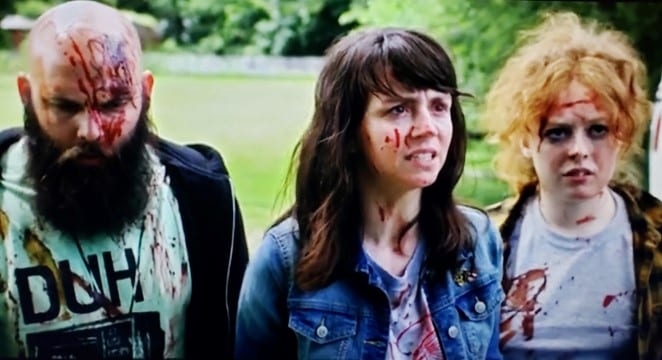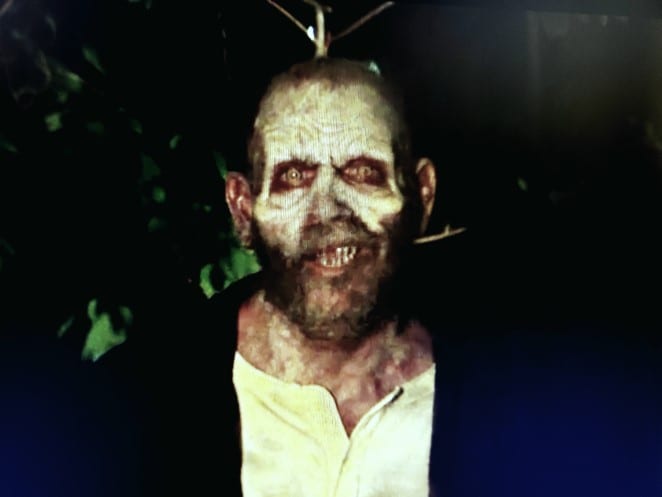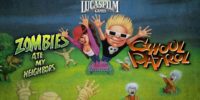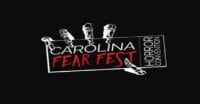Any opening claim “based on a true story” often activates a certain skeptical gaze. In the case of Uncle Peckerhead, after that familiar phrase flashes, an assessor quickly jumps to a conclusion. After all, the film begins with someone getting gorily devoured by a demon. So naturally, one can only conclude there’s a truth to this film. From bath salt-fueled cannibals to notorious serial killers, there is a history of people eating people even when they don’t want to get eaten. It’s tempting then to plunge into the movie’s honesty the same way features like Fargo assert authenticity. However, it’s entirely possible that the movie simply opens with a brilliant joke right from the get-go.
Uncle Peckerhead is a marvelous gem currently available on a variety of streaming services. It’s the kind of film I like to call a beer and a pizza movie. It fills out a Friday night in the best way possible. Gorging on gore and greasy treats with a cold pint in one hand, Uncle Peckerhead rounds out the evening with comedy as well as horror.
There’s a charming absurdity to this film, as it revels in its blood-drenched premise. The straightforward story involves an aspiring punk band called Duh. About to kick off their first tour, the tragic repossession of their van leaves them in desperate need. To that end, they hire a mysterious stranger who unabashedly goes by Peckerhead. Unfortunately, this initial salvation soon proves problematic. Every night at midnight, Peckerhead turns into a flesh-eating monster. Fortunately, the indomitable band Duh is not deterred. Sure, their roadie is a ghoul, but nobody’s perfect, and as Queen once sang, “The show must go on.”
Making movies is like being a taffy puller. Layers need to be stretched out, in essence, seen, then folded back in before they go too far. It’s easy to pull the whole treat apart, but Uncle Peckerhead is in capable hands.
Writer/director Matthew John Lawrence smartly steers a barebones plot. Revealing the genius of simple narratives, the exposition doesn’t clutter the story, leaving plenty of room for snappy dialogue and crisp one-liners. Furthermore, some filmmakers fail because they forget movies are a visual form of storytelling. Fortunately, that isn’t the case here. A lot more can be said in a well-constructed scene than the cleverest dialogue can ever convey, and that’s certainly the case with Duh’s shows.
Each instance tells the evolution of a band from road rookies to tour veterans. Watching them win over crowds and outperform pretentious rivals is truly satisfying. It doesn’t hurt that Jeff Riddle, who plays bandmember Max, wrote an entire EP of original music that actually slaps. Any fan of stripped-down punk rock like X, The Distillers, or Amyl and the Sniffers will thoroughly enjoy the soundtrack.

Finally, the chemistry between performers pulls together this tasty treat. Chet Siegel delightfully embodies the lead as Judy, a character who clearly did all the work in every group project at school. Her bandmates, played by Ruby McCollister and Jeff Riddle, deliver fabulous support for Siegel, but there is also David Littleton. As the titular character, Littleton provides a charming ghoul who’s hard not to trust. In essence, he’s that drunk uncle who let you play with homemade fireworks. He may not be the best influence, but he always creates memorable moments.
There’s enough blood here to glut any gore-met, and at times, it goes over the top in ways reminiscent of horror-comedy treasures like Evil Dead. The story is a genuine delight that’ll strike a chord with many moviegoers, partly because there’s an optimism to this movie not seen in a lot of horror films. Granted, comedy gives it that space to operate, but in different hands, cynicism could easily overcloud the charm of Uncle Peckerhead.
In many ways, optimism adds to the horror. Instead of sneering at sentimental emotions and punishing them, this movie makes the betrayal of such feelings a relatable nightmare. Duh isn’t composed of people blindly following the idiot plot to ruin. They’re desperate folks trying to endure the lesser of two evils. Oddly enough, having a murderous ghoul for a roadie is better than ditching your dreams when they seem in reach. It’s a decision a lot of people can relate to on some level. The upshot is that, unlike other comedy horror flicks, Uncle Peckerhead makes its main characters endearing rather than avatars for sardonic annihilation.
Like all good horror films, the audience doesn’t want anything bad to happen to Duh, and whether they are in danger fuels some of the tension. Peckerhead’s murderous rampages seem, at first, intentionally aimed away from them. He even appears to be brutal for their benefit. At times, ol’ Uncle Peckerhead comes across like a feral puppy savaging fools, and that makes for comedy-horror gold. What’s interesting, though, is that the very gore entertaining the audience is clearly eating away at Duh. At the very least, Chet Siegel’s Judy. Peckerhead doesn’t just devour flesh, he eats sanity and morality as well, making him a compelling, albeit lighthearted villain. That said, make no mistake, he’s hardly the film’s only rogue.
Myriad lesser evils plague Duh along the way. Events unfold that make it clear one shouldn’t be surprised by the presence of real demonic entities. After all, they’re already living in a kind of hell. The proof of that fact: Duh’s many miserable run-ins with other people. Though it could be said, these sour encounters emphasize the sweet, sweet satisfaction of bloody revenge.
From crooked concert venues to conceited rival bands, there’s a flavor of the real world in this film. Genuine minor villains peppered throughout offer an air of authenticity that stirs wonderfully morose delectation. The audience can’t help having evil thoughts, which Peckerhead does the kindness of bringing to life. In a weird way, he becomes a borderline anti-hero. Whether or not they deserve the severity of their punishment is, perhaps, debatable. However, the beauty of fiction is the ability to go over the top, something Uncle Peckerhead excels in. After all, to some of us, watching unpleasant people get brutalized into demon chow is a delight.
Still, that room for debate is one of the things that makes this a quality beer and a pizza movie. It stirs up a varied conversation, especially as it carries the audience to moments that feel familiar. At the risk of spoiling a moment, there’s a wonderful friendly tension as Jeff Riddle and Chet Siegel via for the attention of the same attractive himbo. I defy anyone not to know what it’s like to be in that situation and so relate to the characters involved. Moreover, it’s hard to know who to root for in their brief contest.
What makes this movie a real gem is the fact that it operates on multiple levels. One can dissect it to various degrees, all of which are potentially true. There’s enough material to make cases for feminist interpretations, a coming-of-age road trip, and being, as Alice Cooper once put it, “Lost in America.” However, it’s also possible to simply sit back, crack a beer and a smile, and have a good laugh. In that way, Uncle Peckerhead has a little something for everyone: a headbanging soundtrack, absurd yet gruesome gore, and quality laughs—this Friday night delight is well worth watching.




